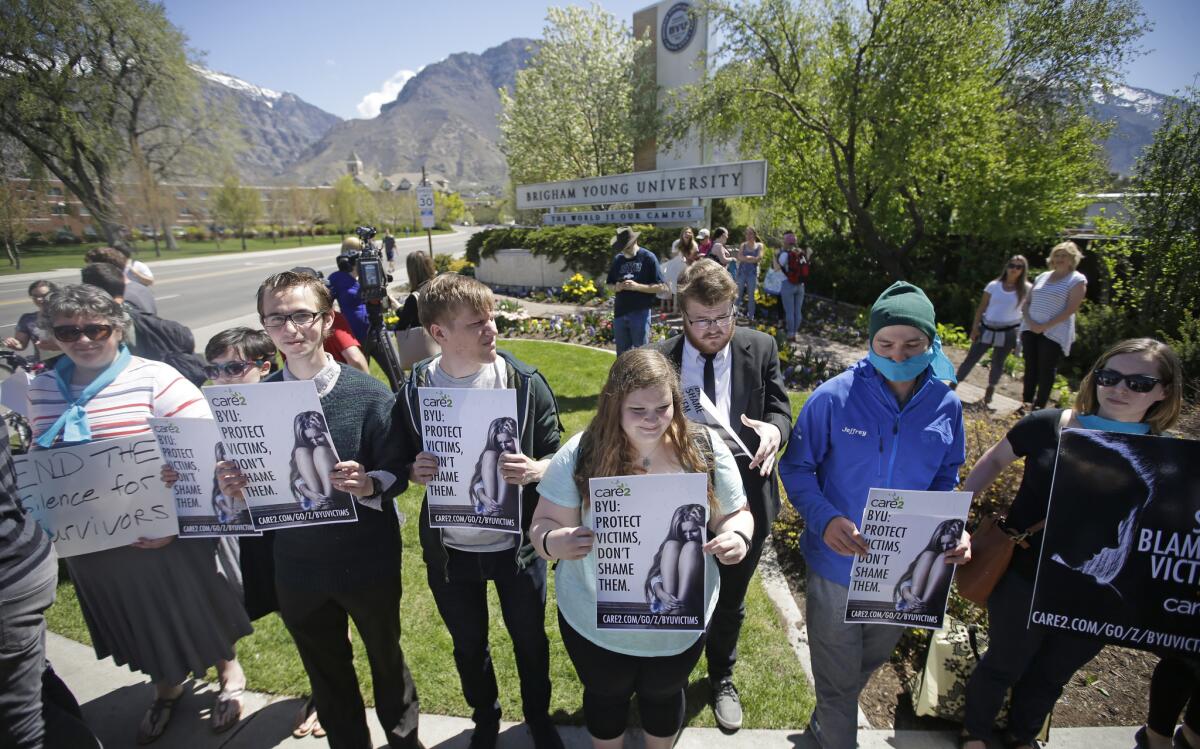Op-Ed: Absurdity reigns in campus sexual assault trials

Protesters stand in solidarity with rape victims on the campus of Brigham Young University during a sexual assault awareness demonstration in Provo, Utah on April 20.
- Share via
There’s an old legal adage that good facts make good law, and bad facts make bad law. In the case of campus sexual assault, it may be that absurd facts will — eventually — make good law too.
About five years ago, the Department of Education’s Office for Civil Rights issued a letter that would change the face of campus sexual misconduct proceedings at colleges across the country.
The letter directed university administrators to judge allegations according to the lowest burden of proof available: the preponderance of the evidence, a mere 50.01% certainty that whatever the accuser claimed actually happened. It also highly discouraged cross-examinations, suggesting they might violate federal anti-discrimination law.
To avoid the government’s ire — and bad press — colleges set up hard-line, zero tolerance policies. They began suspending or even expelling students on the basis of allegations that, even if true, fell short of what most people understand as “assault.” In recent months, however, some disputes have migrated from campuses to the real-world court system, and real-world judges are pushing back on absurd situations with common sense.
One case involves two Brandeis students who dated for almost two years. Six months after the breakup, the young man who’d ended the relationship filed a two-sentence complaint against his former boyfriend, alleging “numerous inappropriate, non-consensual sexual interactions.”
No details, no specific incidents — just that two-sentence complaint about bad things that happened during a lengthy relationship.
Brandeis immediately launched an investigation and charged the accused with 12 separate violations of school policy. He was ultimately found responsible for four of them — three counts of sexual misconduct and one count of invasion of privacy. As a result, he was fired from his internship and forced to explain what happened to every potential graduate school or employer.
His crimes? Looking at his boyfriend naked when they were in a communal bathroom during their relationship; waking his boyfriend up by kissing him; trying to perform oral sex on his boyfriend when they were staying at the boyfriend’s father’s house; and, at the start of their relationship, putting his hand on his boyfriend’s crotch.
That’s right -- someone was punished for waking up another person in a long-term relationship with a kiss.
That’s right — someone was punished for waking up another person in a long-term relationship with a kiss.
In the logic of campus proceedings, this outcome makes a certain kind of sense. A kiss — or any other sexual contact — is non-consensual if the other person is asleep. And the Department of Education has told colleges that they mustn’t treat non-consensual contact lightly. Yet campus rules overlook the realities of relationships and how people function in them.
Failed by university administrators, the accused student sued Brandeis in federal court, alleging that the school had, among other things, violated its promise to conduct his disciplinary proceeding with “basic fairness.” In a forceful decision, a U.S. District Court judge lambasted Brandeis for how it treated the student, noting that “there are few things in life as complex as a long-term relationship” and permitted the case to move forward.
In another case, a student sued the University of Southern California for suspending him for a year — not for sexually assaulting his accuser, but for failing to intervene quickly enough when someone else slapped her on the bottom. The school did this despite a complete lack of evidence that the student knew the slap was coming or could have done anything to prevent it.
The court threw out USC’s decision entirely and ordered the student back to school. In the span of two pages, it used the words “no evidence” four separate times.
Sexual assault does occur on college campuses, and schools are right to take it seriously. But that doesn’t mean common sense has to go out the window. It is no less ridiculous to brand a college student a rapist for making an unwanted pass at his boyfriend than it is to brand a 7-year-old a threat for eating a Pop-Tart into the shape of a gun. Yet in the mindless world of zero tolerance, such distinctions are lost.
Sex, especially between college students, is messy and confusing. The notion currently in vogue that students must give explicit consent at every step of the way may be great in theory, but that’s just not how people behave. People in romantic relationships sometimes wake each other with a kiss. Maybe the other person doesn’t want the kiss — or doesn’t want to be woken up — but does such behavior warrant even a formal response from a university, much less punishment?
Slowly but surely, courts may be starting to realize that they have a role to play in making sure that schools treat everyone fairly, both the accusers and the accused. As any economist (or any parent) will tell you, people respond to incentives. If colleges fail to bring common sense back into their disciplinary processes, then courts may force them to do that — and absurd facts will make good law.
Justin Dillon and Matt Kaiser are partners at Kaiser, LeGrand & Dillon in Washington and have represented dozens of students nationwide in campus sexual assault cases.
Follow the Opinion section on Twitter @latimesopinion and Facebook
A cure for the common opinion
Get thought-provoking perspectives with our weekly newsletter.
You may occasionally receive promotional content from the Los Angeles Times.






